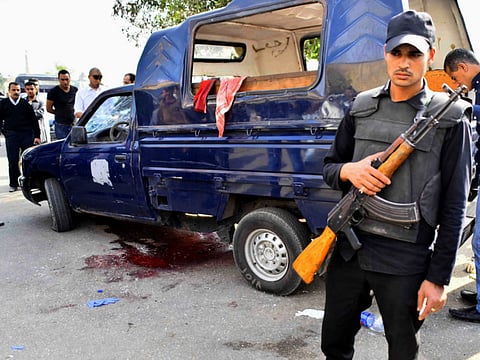‘Lone wolves’ rear heads in Egypt mainland
Militants increasingly netted in residential areas

Cairo: In a windy, narrow street in the populous Cairo district of Hadayek Al Maadi, police last week fought for hours against militant suspects. Two suspects were killed and two police officers were injured in the gun battle.
On Sunday, police raided a house of other suspects in the village of Al Kuraymat in Giza south of Cairo, killing four in an ensuing exchange of fire. Insurgents blew up the apartment where they were living last month when a security force raided it in the area of Al Haram near the Giza Pyramids. Seven policemen and three civilians were killed in the incident.
In each raid, authorities said that police had seized arms caches. One police officer, who survived death in the Al Haram swoop, told a local TV station that the seized explosives were “enough to detonate Egypt”.
“The Interior Ministry calls on Egypt’s honest citizens to swiftly inform about any suspected elements who may reside in residential areas,” the ministry said in a statement this week.
Egypt has seen an upsurge in attacks mainly targeting security forces since the army’s 2013 toppling of Islamist president Mohammad Mursi following massive protests against his rule.
Traditionally, terrorists took refuge in remote areas of the country, with the vastly Sinai desert being the scene of their operations. However, in recent months, insurgents have shifted their attention to other areas in Egypt’s mainland, including the Greater Cairo zone, which has a population of around 20 million.
The extremists, who were killed and arrested in recent crackdowns in residential areas, were reportedly involved in attacks against security personnel and checkpoints in Greater Cairo, which includes the capital, Giza and Qaliubia. Several of them had no previous history of militancy and violence, raising fears of emergence of “lonely wolves” or persons unknown to authorities.
“The areas with a large population provide an ideal shelter to terrorist elements to hide and operate away from the police’s eyes,” said Mamdouh Abdul Halim, a military expert. “In such areas, they can easily find apartments for cheap rents unlike the prices and procedures related to renting apartments in high-class areas,” he told Gulf News.
“They can turn these apartments into warehouses of explosives without attracting the attention of ordinary people and authorities. This situation increases burdens on security agencies that need to collect information before raiding any suspected den and have to race against time to abort planned attacks. Moreover, having terrorists living among ordinary people increases risks especially as in most cases they were the first to open fire at police. Therefore, security forces would have to act very carefully when they launch operations against these terrorists to prevent casualties among civilians.”
In the wake of recent police swoops on suspects in residential areas, authorities have tightened procedures for renting and owning houses. Real-estate brokers and landlords say they have received “strict instructions” to get copies of new tenants’ ID cards, especially those of strangers, and show them to local police station.
“This step is very important to tighten the noose around terrorists,” said Abdul Halim, the military expert.
He explained that a common belief among real-estate agents and house owners is that notifying authorities of new contracts will cost them money.
“They think they will have to pay taxes or other fees. “This is untrue. Authorities and the media have to refute this wrong idea and encourage people to cooperate,” he said. “Citizens should realize that the price they will pay is high when they leave their apartments turn into warehouses of explosive devices.”



